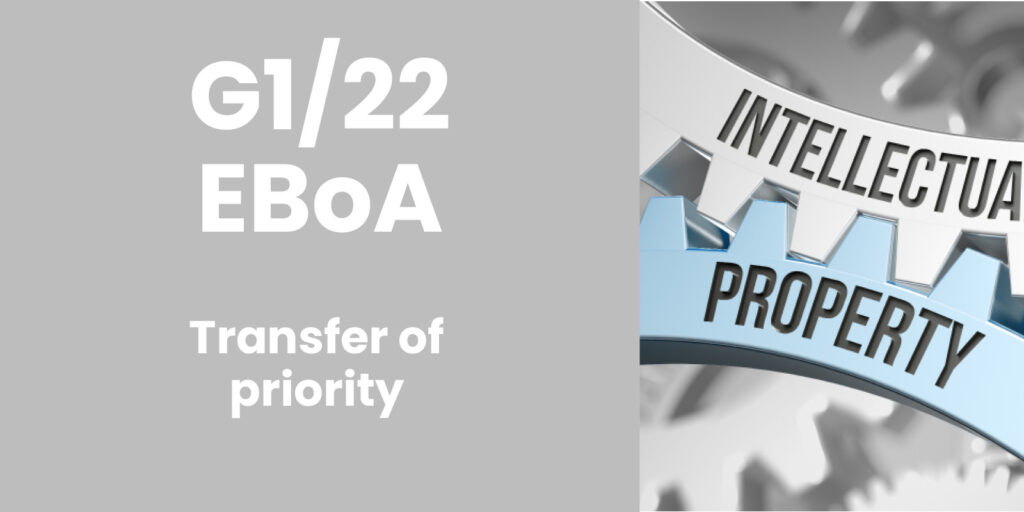G1/22 EBoA – Transfer of priority

- Kaisa Suominen
- –
- News
- –
- 15.11.2023

The Enlarged Board of Appeal of the European Patent Office recently issued a decision in the consolidated cases G1/22 and G2/22 concerning the right to claim priority from an earlier application, when the applicants are not the same.
Background of the decision
The decision follows an opposition proceedings (G1/22) and grant proceedings (G2/22), in which the priority application is the same. The EP-patent subject to the opposition proceedings is based on a Euro-PCT application, and the EP-application in the grant proceedings is a divisional application thereof. The priority application was filed in the US under the previous patent law, i.e. at a time when only the inventors could be applicants in the US. The applicants of the priority application were the three inventors, and the applicants of the PCT-application were the inventors for US and two other parties for the other countries. In the opposition and grant proceedings the priority claim was held invalid, as only one of the inventors had transferred their right to the priority to the party that was the applicant at the time of grant, before filing of the PCT-application. The two other inventors had transferred this right only after filing of the PCT-application. In consequence, claim 1 of the patent was not novel and the application was refused.
Conclusions of the Enlarged BoA
According to EBoA, right to claim priority is to be assessed under the EPC, although the national law may need to be taken into account, for example when assessing the existence of legal entities as parties to the transfer. Furthermore, the EBoA decided that there are no formal requirements for the transfer of the priority right.
One conclusion of the EboA is also that entitlement to priority is to be presumed to exits. The burden to prove that there is in fact no right to priority is on the party alleging this and facts that support strong doubts that at the time of filing of the application, the applicant did not have the right to claim priority, must be given in support of the allegation.
The EBoA was even of the opinion (paragraph 100 of the decision), that the right to claim priority does not need be transferred before the filing date of the application, unless the national law so requires. The board was thus of the opinion that the EPO cannot require more than what national law does.
The Enlarged Board of Appeal therefore confirmed the previous approach of the EPO on transfer of priority, i.a. that if the EP-application has at least one same applicant as the priority application, the applicants are presumed to have the right to priority, unless proven to the contrary. The board was also significantly more liberal that EPO’s previous approach as to the timing of the transfer, by allowing transfer even after filing of the application (if allowed by national law).
It is also worth noticing that according to the decision (paragraph 35), it also applies to situations where a document cited as a bar to the patentability claims priority, and not only to situations where the application or patent under examination claims priority. It is thus good to check also the priority data of relevant prior art.
What would be the practical consequences of this decision?
Even after decision G1/22 and G2/22 it is recommended to ensure, with a written agreement, that right to claim priority is transferred before filing of the application. Alternatively, for example if there is no time before filing of the application, the later application can be filed in the name of the applicant of the priority application, and a transfer effected after filing. The reason is that decisions of EPO’s EBoA are not binding on national courts or the Unified Patent Court (UPC), although the EPO and the UPC aim at harmonised proceedings.
Any questions? Please contact kaisa.suominen@laineip.fi

